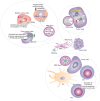Mesenchymal Stem-Cell-Derived Exosomes as Novel Drug Carriers in Anti-Cancer Treatment: A Myth or Reality?
- PMID: 39936993
- PMCID: PMC11817634
- DOI: 10.3390/cells14030202
Mesenchymal Stem-Cell-Derived Exosomes as Novel Drug Carriers in Anti-Cancer Treatment: A Myth or Reality?
Abstract
Although cancer therapy has significantly advanced in recent decades, patients and healthcare professionals are still quite concerned about adverse effects due to the non-targeted nature of currently used chemotherapeutics. Results obtained in a large number of recently published experimental studies indicated that mesenchymal stem-cell-derived exosomes (MSC-Exos), due to their biocompatibility, ability to cross biological barriers, and inherent targeting capabilities, could be used as a promising drug-delivery system for anti-cancer therapies. Their lipid bilayer protects cargo of anti-cancer drugs, making them excellent candidates for the delivery of therapeutic agents. MSC-Exos could be engineered to express ligands specific for tumor cells and, therefore, could selectively deliver anti-cancer agents directly in malignant cells, minimizing side effects associated with chemotherapeutic-dependent injury of healthy cells. MSC-Exos can carry multiple therapeutic agents, including anti-cancer drugs, micro RNAs, and small bioactive molecules, which can concurrently target multiple signaling pathways, preventing tumor growth and progression and overcoming resistance of tumor cells to many standard chemotherapeutics. Accordingly, in this review article, we summarized current knowledge and future perspectives about the therapeutic potential of MSCs-Exos in anti-cancer treatment, opening new avenues for the targeted therapy of malignant diseases.
Keywords: anti-cancer agents; exosomes; mesenchymal stem cells; micro RNAs; target therapy.
Conflict of interest statement
Author Dr. Carl Randall Harrell is the Founder, Chairman, and CEO of the company Regenerative Processing Plant, LLC. The remaining authors declare that the research was conducted in the absence of any commercial or financial relationships that could be construed as a potential conflict of interest.
Figures

References
Publication types
MeSH terms
Substances
Grants and funding
LinkOut - more resources
Full Text Sources
Medical

